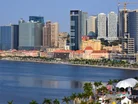Angola ports, terminals and logistics plans provide openings

Construction firms could be beneficiaries after the Government of Angola and DP World signed an MoU to develop the African country’s trade and logistics sector.
The MoU, signed in Luanda, would pave the way for the two parties to explore cooperation in the areas of developing ports and terminals, and special economic zones and logistics parks. The agreement will also cover cross border trade facilitation, trade finance, and marine services, as well as logistics support in other commodity-based sectors, it added.
Ricardo Viegas d’ Abreu, Angola’s Minister of Transports, said: “DP World is a strategic partner for the transport and logistics sector in Angola, because it brings together the professionalism and skills necessary to drive the vision of an integrated and sustainable economy, with an effective and efficient logistics chain. With this partnership, it will be possible to promote and boost Angola's industrial development, as well as its cross-border and international trade".
DP World began operations at the Multipurpose Terminal (MPT) at the Port of Luanda on March 1 2021 after it was awarded a 20-year concession to manage, operate and modernise the facility.
Since then, DP World Luanda has invested in new equipment and facilities, technology and the development and training of staff, as part of a US$190mn initial investment to transform the terminal into a major maritime hub along the western coast of Southern Africa.
Sultan Ahmed Bin Sulayem, Group Chairman and CEO of DP World, said: “Alongside the Multipurpose Terminal, there is still tremendous opportunity to further develop and integrate the country’s logistics and trade infrastructure and unlock more economic benefits. The Angolan government has an ambitious plan for this sector, and through this MoU our primary objective is to find ways in which we can support the country to significantly maximize its strategic location and increase trade flows domestically and in the surrounding region.”
Following the implementation of the MPT’s development and modernisation plan, the teams at DP World Luanda increased operational efficiency threefold within the first six months of starting operations. The team also achieved the feat of being the first terminal in the country to handle two large vessels simultaneously, Bin Sulayem added in conclusion.
The construction sector accounts for over 15.5% of Angola’s GDP, around 6% higher than it did between 2006-2014, when the government focused on repairing and modernising infrastructure following the civil war.
While thousands of companies are involved and registered locally, there are few large local civil works companies, and the sector is dominated by Chinese, Brazilian and Portuguese companies.
The key challenges that the sector faces include corruption and lack of planning and poor supervision of public works on state projects, as well as late payments from the government. Construction companies reported that their top challenges were difficulty obtaining materials, a fall in demand and a difficulty getting finance. Government work accounts for the bulk of the sector's work. However, a private market, including the provision of residential housing, is beginning to grow.
- Zeo Energy & Creekstone Energy: Building a 10GW Data CentreConstruction
- Top 10: Demolition & Decommissioning FirmsMaintenance & Operations
- Schneider & Bloomberg Aim to Future-Proof Global BuildingSustainability & Green Building
- How Data is Driving McCarthy's Sustainability TransformationSustainability & Green Building



